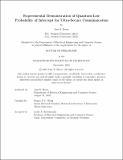Experimental Demonstration of Quantum Low Probability of Intercept for Ultra-Secure Communication
Author(s)
Heyes, Jane E.
DownloadThesis PDF (6.820Mb)
Advisor
Wong, Franco N.C.
Terms of use
Metadata
Show full item recordAbstract
Secure communication systems utilize encryption with shared keys between the sender and receiver of the encrypted message. For added security, the encrypted message can be hidden within a significant amount of noise so that the eavesdropper could not even extract the actual encrypted message, let alone decrypt it. However, such a system, called low probability of intercept (LPI), also uses a shared key which is susceptible to security failure caused by key disclosure, just like encryption systems. A quantum version of LPI, or QLPI, operates entirely differently: the key for quantum low probability of intercept (QLPI) is transient and not shared, and its security is based on the quantum no-cloning theorem. In this work, we will present a tabletop proof-of-concept experiment to demonstrate QLPI, achieving errorfree secure communication at an internet-compatible rate of 0.5 Gbps over the equivalent of 50 km of telecom fibers.
Date issued
2023-09Department
Massachusetts Institute of Technology. Department of Electrical Engineering and Computer SciencePublisher
Massachusetts Institute of Technology